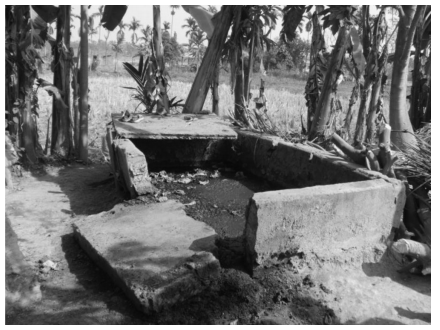Even in the presence of mandated service agreements maintenance for biodigesters can still be an issue. For example, time constraints on private contractors [1] from central government to install and maintain digesters, lead to a slipping in maintenance standards. In a village in Assam interviewed in the paper, no follow up visits from the contractors were had for four years, and a 20% digester failure rate was recorded. Communications issues were a key contributor to this: the fact that a provision of a half of the installation subsidy for maintenance of plants over 5 years old was not communicated to households or the contractors.
A broken biodigester in Assam, India, having not been repaired for 6 months. Source: Raha, Mahanta & Clarke (2014) The implementation of decentralised biogas plants in Assam, NE India: The impact and effectiveness of the National Biogas and Manure Management Programme. http://dx.doi.org/ 10.1016/j.enpol.2013.12.048
One of the more overlooked aspects of biogas digester services and operation is the maintenance requirements of digesters. Older digester designs (for example dome-type biodigesters constructed from brick or earth) require a regular maintenance schedule (monthly to quarterly is common) [2] in order to maintain best performance, including maintaining the chemical balance of the digesting chamber and its structural integrity, repairing cracks in the chamber if necessary. More modern household and collective-scale designs are based off a plastic digesting chamber, usually fibreglass-reinforced plastic (FRP), and as such require less intensive maintenance (annual maintenance visits are sufficient), but still have a maintenance burden to address for peak performance (for example, maintaining the chemical balance of the digester through appropriate feedstock insertion).
However, even in the presence of mandated service agreements for biodigesters, for example delivered through a fee-for-service energy service company (ESCO), maintenance can be overlooked. A useful case study illustrating this can be obtained from India’s National Biogas and Manure Management Program (NBMMP) [1]. The NBMMP relied on local governments in India contracting the private construction sector to construct biogas digesters for rural communities. Time constraints on these contractors on installation, stemming from the prevailing climatic conditions limiting the working period of the year due to monsoons, meant that maintenance standards, for which the contractors under the tender from local government were also responsible, and the overall quality of installation of digesters, slipped drastically. Some contractors reported having to fill an annual allocation of 6,000 digester installations in just three months, at a rate of over 60 digesters per day, often for small companies of just 5-10 technicians. Hence, some digesters were not being maintained for four years or more, and there was a 20% overall digester failure rate. Communication between the public bodies and private contractors was also an issue: the NBMMP made provision of half the subsidy granted to households for purchasing digesters as a maintenance grant over a five-year period, which was barely taken advantage of due to a lack of awareness on the part of households and contractors.
This case study makes clear the necessity of accounting for maintenance arrangements in the design of any biodigester business plan or program. Ensuring the maintenance schedule is followed will extend the life of the biodigester and improve its performance, resulting in greater satisfaction with the system from the point-of-view of end-users. This fact makes biodigesters particularly suited to a fee-for-service business model: regular maintenance can easily be combined with regular payment collection visits, reducing the cost burden on the company/organisation and improving service.
The final post in this series will focus on the recent evolution of the Chinese National Biogas Program, and the lessons to be learned for cross-application in other regions globally.
– Xavier Lemaire and Daniel Kerr, UCL Energy Institute
[1] Raha, Mahanta & Clarke (2014): http://dx.doi.org/10.1016/j.enpol.2013.12.048
[2] Surendra et al (2014): http://dx.doi.org/10.1016/j.rser.2013.12.015

